Hollywood’s pipeline may be slowed due to the aftereffects of strikes we’re still dealing with, but our snapshot of the best films of the season is as packed as ever. Big-budget musicals, dark supervillain sequels, big-budget musicals that are dark supervillain sequels, international charmers and sharp indie standouts all crowd the calendar. Cautionary tales of personal transformation jockey with euphoric ones; Oscar-winning legends compete for eyeballs with first-time visionaries; and gladiators do battle with other gladiators. We asked our film writers for their personal must-sees.
‘My Old Ass’ (Sept. 13)
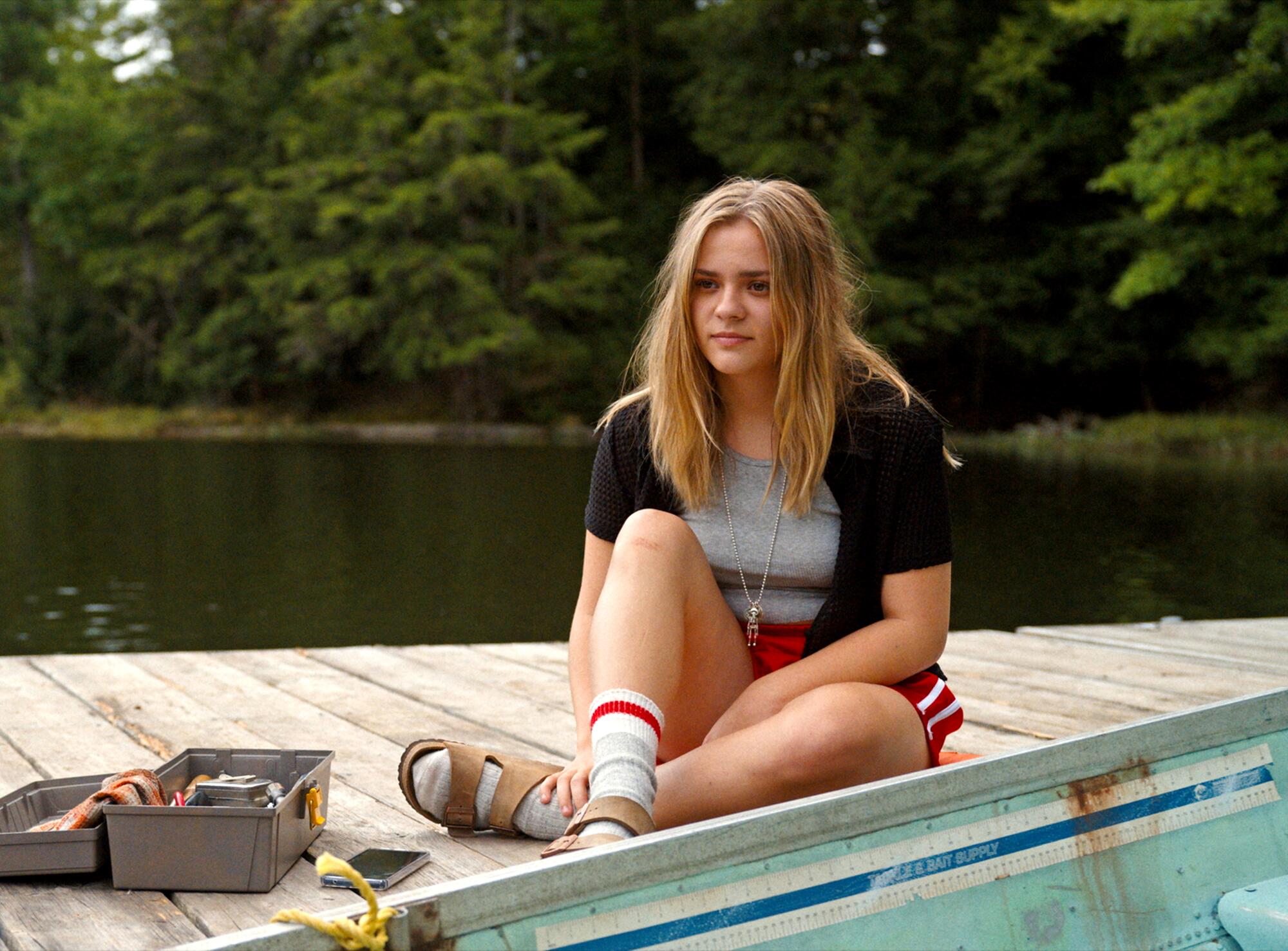
Maisy Stella in the move “My Old Ass.”
(Amazon Studios)
One summer night before she leaves for college, an 18-year-old girl does mushrooms and finds herself face-to-face with the 39-year-old version of herself. That plot description doesn’t exactly suggest a heartfelt tearjerker of a movie. (Neither does the title.) But that’s exactly what director Megan Park’s feature debut is: a short, sweet gem of a coming-of-age story that will leave you looking back at your adolescence with rose-colored glasses. Aubrey Plaza plays the older version of the protagonist, though it’s newcomer Maisy Stella — whom you might know as the younger sister from the viral sibling singing duo Lennon & Maisy — whose performance you’ll leave talking about. The film, which was produced by Margot Robbie, slayed at Sundance last year and was quickly snapped up for a reported $15 million after a bidding war. If we had to call it now, we’d say Barbie has another hit on her hands. — Amy Kaufman
‘A Different Man’ (Sept. 20)
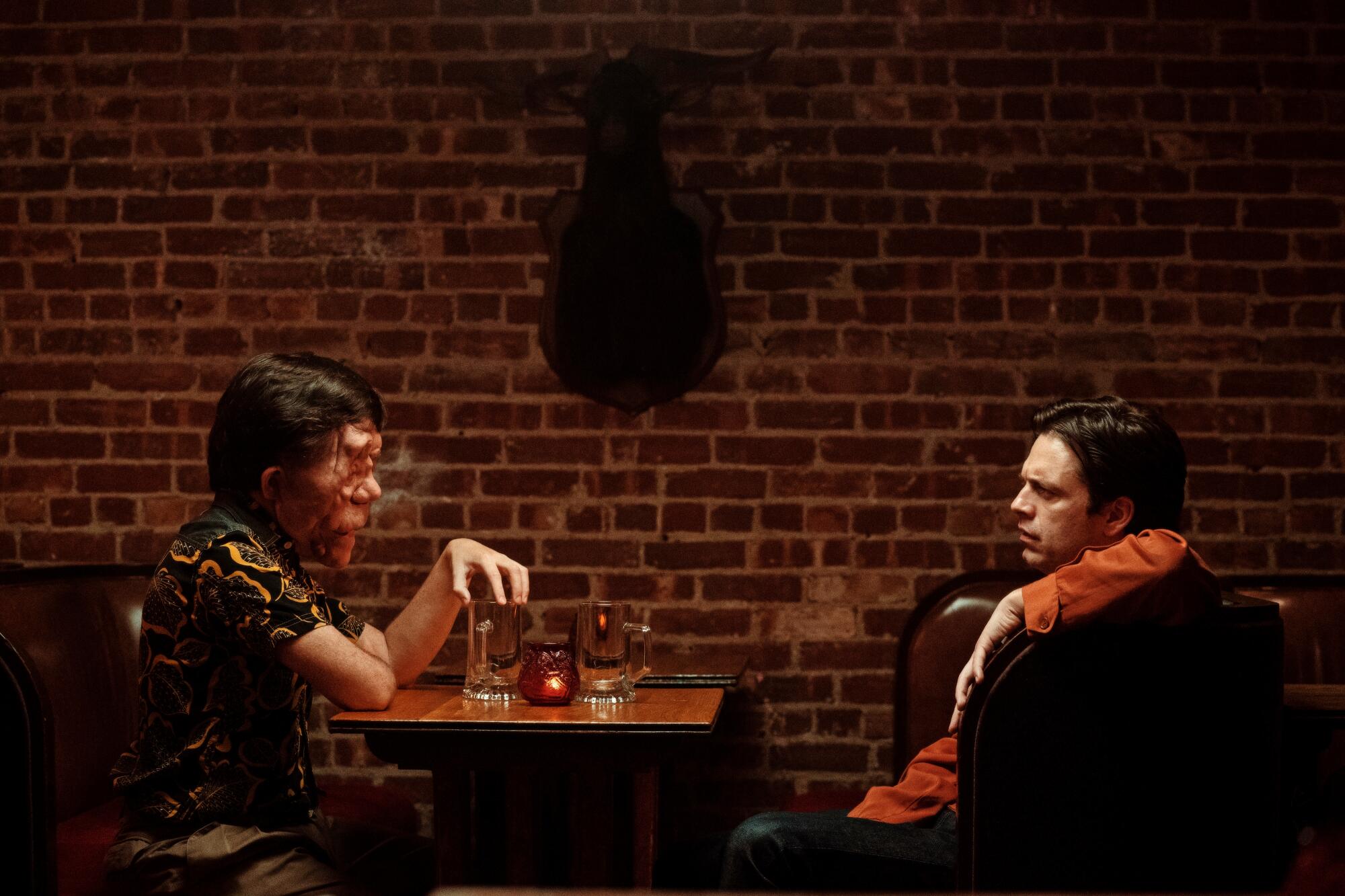
Adam Pearson, left, and Sebastian Stan in the movie “A Different Man.”
(Matt Infante / A24)
Pitched somewhere between the body horror of David Cronenberg and the meta surrealism of Charlie Kaufman, writer-director Aaron Schimberg’s darkly satirical psychological thriller is hard to describe and even harder to shake. Sebastian Stan stars as an aspiring actor born with facial disfigurements who undergoes an experimental procedure to transform his appearance, only to find himself losing the role he was born to play — himself — to a man with the same deformity (played by “Under the Skin’s” Adam Pearson, who has neurofibromatosis). The A24 film, which earned strong buzz at this year’s Sundance and co-stars Renate Reinsve (“The Worst Person in the World”), ambitiously takes on complex themes of identity and societal preconceptions about beauty and disability. Most of all, it is just plain different. — Josh Rottenberg
‘The Substance’ (Sept. 20)

Demi Moore in the movie “The Substance.”
(Christine Tamalet / Mubi)
“Everybody’s a dreamer / And everybody’s a star / And everybody’s in movies / It doesn’t matter who you are.” The opening lines to the Kinks’ classic song “Celluloid Heroes,” about the ephemeral nature of fame, comes to mind when watching Coralie Fargeat’s “The Substance,” a body-horror film that manages to be both primal and compassionate, bludgeoning and insightful. Elisabeth Sparkle (Demi Moore, never better) has a star on Hollywood Boulevard, but it has faded and fallen into disrepair, much like the career of its honoree. She’s on the wrong side of 50, has been fired from her retro-style exercise show and is so desperate that she’s considering submitting to a back-alley rejuvenation regime. Soon, Elisabeth has a clone, Sue (Margaret Qualley), young and taut. For the science to work, Elisabeth and Sue must switch places every seven days. But there wouldn’t be a movie if that went off without a hitch, and as the situation begins to deteriorate, Fargeat amps up the gore and gruesomeness to epic levels. It’s truly ugly. And that’s the point. Because, as Ray Davies noted behind the mic, “Success walks hand in hand with failure on Hollywood Boulevard.” — Glenn Whipp
‘Megalopolis’ (Sept. 27)
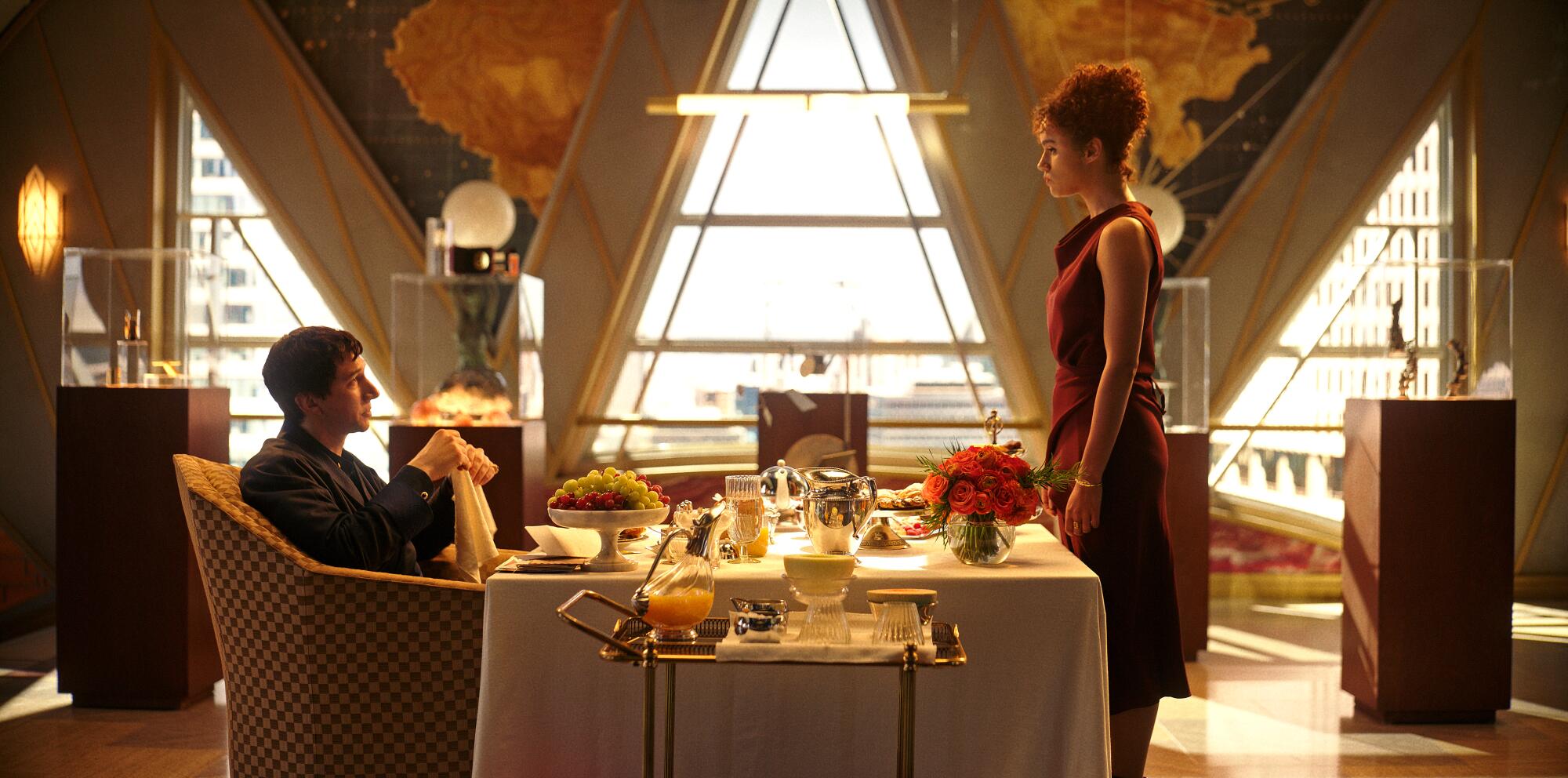
Adam Driver and Nathalie Emmanuel in the movie “Megalopolis.”
(Lionsgate)
Was it just a dream or did Francis Ford Coppola debut his long-gestating passion project (and first movie in 13 years) at this year’s Cannes Film Festival? He did! I’m not making that up. And I can’t wait to see it again, in all its radical craziness. “Megalopolis” isn’t well-served by synopses that call it a “city poem” or yoke its wild ambitions to ancient Rome’s power struggles or municipal intrigue. Those things are true, fine, but let’s stop trying to make this movie into another crime epic like “Godfather.” It is very much its own beast, loosely about a gifted architect (Adam Driver) and the many people around him who either help or hinder his vision. You’re going for the deep ensemble, which includes Giancarlo Esposito, Kathryn Hunter, Laurence Fishburne, Dustin Hoffman and Aubrey Plaza, the latter playing some kind of dazzling media creation named Wow Platinum. — Joshua Rothkopf
‘Joker: Folie à Deux’ (Oct. 4)

Lady Gaga and Joaquin Phoenix in the movie “Joker: Folie à Deux.”
(Niko Tavernise / Warner Bros. Pictures)
I have remained relatively neutral about the first “Joker” since it came out in 2019, even when the gritty Batman villain origin story became a box-office smash and won two Oscars. But the fact that the Warner Bros. sequel is actually a romance-driven jukebox movie-musical — complete with Lady Gaga as Harley Quinn — is a helluva choice, one that I have to see to believe. Director Todd Phillips, I will most definitely be seated for this comic-book-based song-and-dance, especially since I’ve been waiting for Joaquin Phoenix to sing onscreen again since his brilliant turn as Johnny Cash in “Walk the Line.” I’m excited to witness his maniacal vocal stylings on haunting covers of well-known songs, which I’ll probably never be able to hear in quite the same way again. — Ashley Lee
‘The Apprentice’ (Oct. 11)
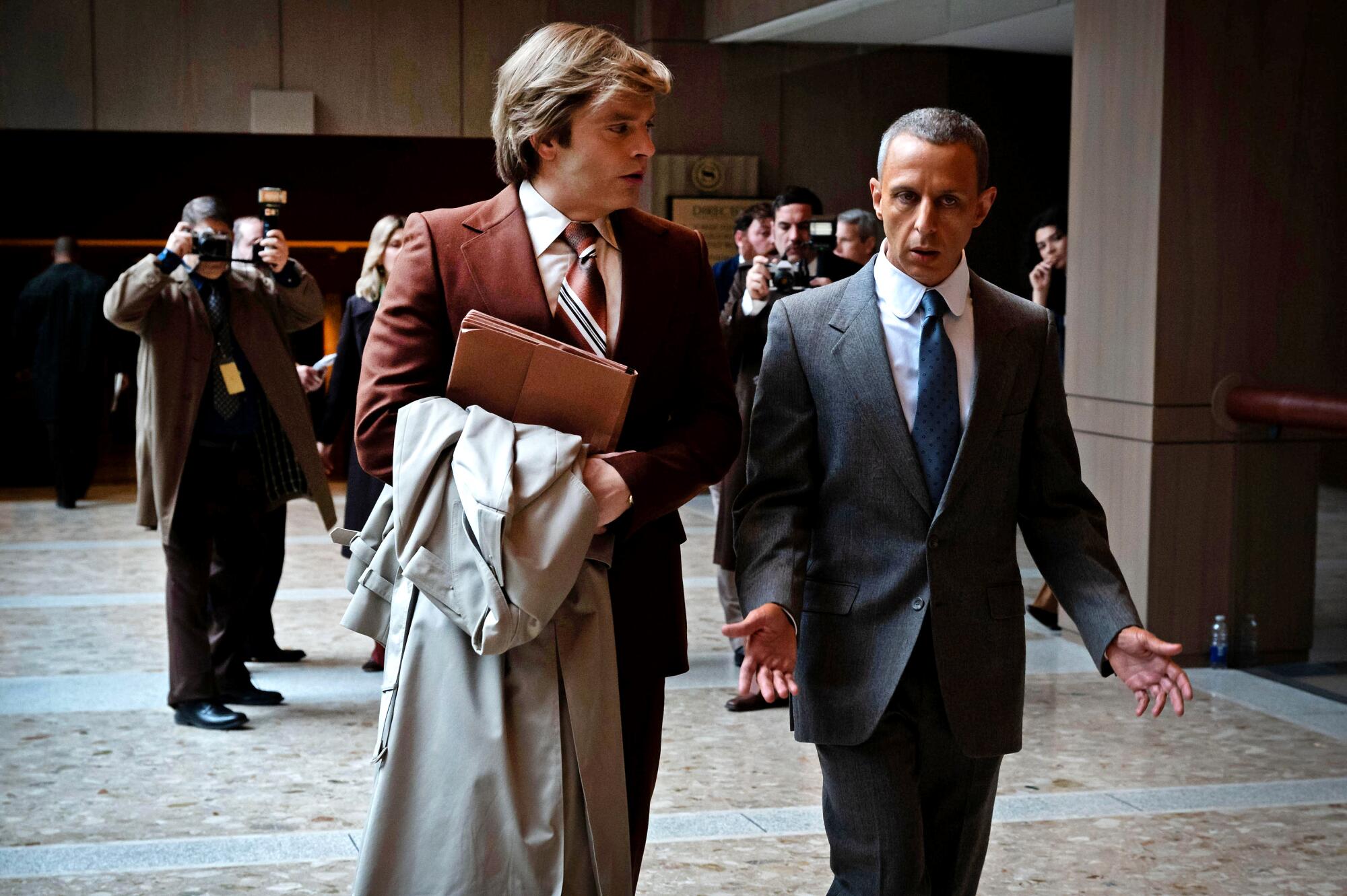
Sebastian Stan, left, and Jeremy Strong in the movie “The Apprentice.”
(Pief Weyman / Apprentice Productions)
Don’t be fooled by the title — this is not a big-screen reboot of the hit NBC reality show in which contestants competed for a top spot in Donald Trump’s real estate empire. In fact, the tagline of this film could very well be “The movie Donald Trump doesn’t want you to see.” Although the former president and current Republican presidential nominee has not seen the film, he is fighting to keep this fictionalized account of his early days in real estate and his relationship with infamous attorney Roy Cohn out of theaters. “The Apprentice,” which scored favorable reviews out of Cannes, is a less-than-flattering portrait of Trump, and has a scene in which he assaults his first wife, Ivanka. Starring Sebastian Stan (“Captain America: The First Avenger”) as Trump and Jeremy Strong (“Succession”), it will definitely pour more fuel on an already volatile election season. — Greg Braxton
‘We Live in Time’ (Oct. 11)
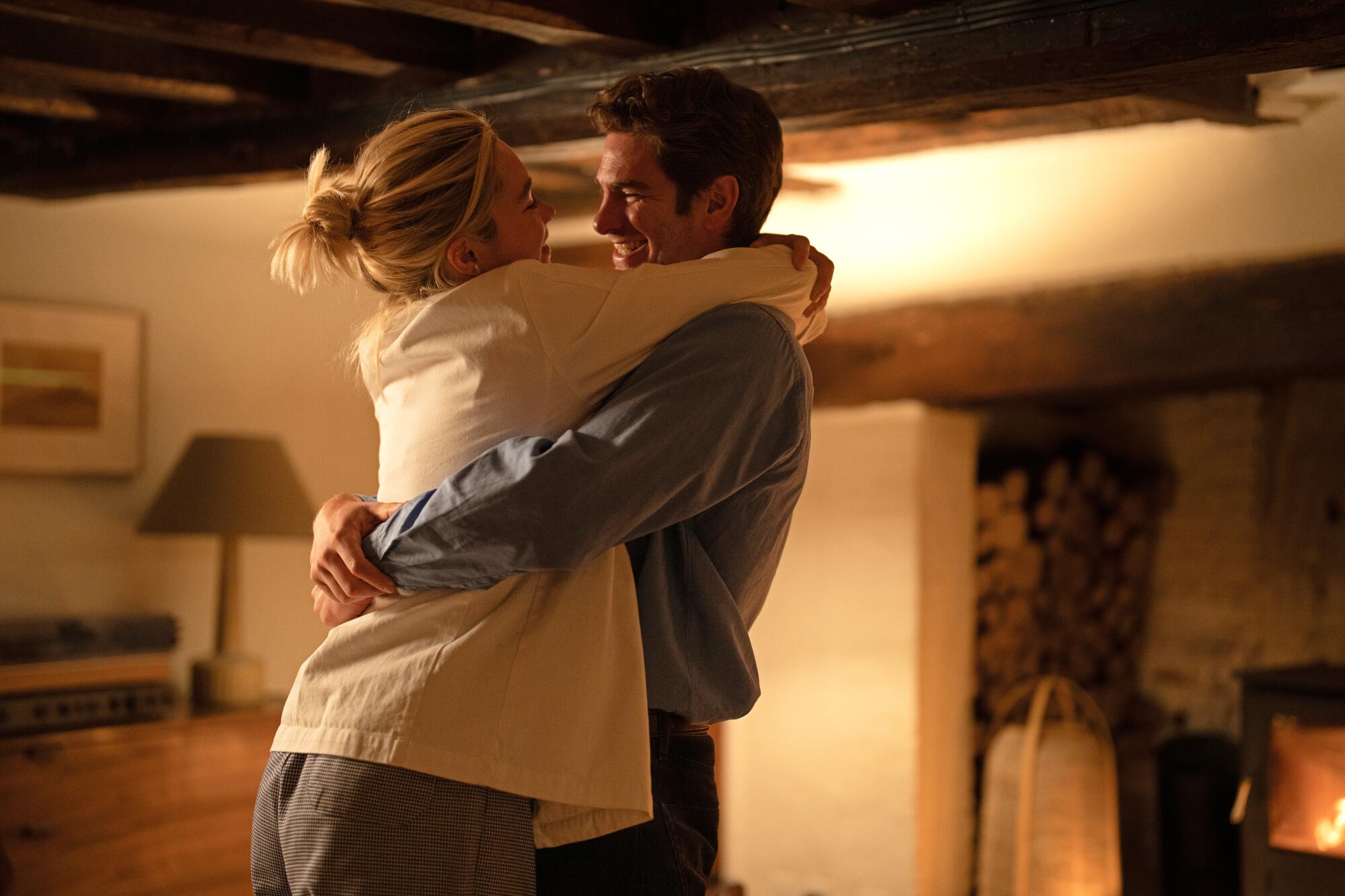
Florence Pugh and Andrew Garfield in the movie “We Live in Time.”
(Peter Mountain / Studiocanal)
Do I need to say anything more than this is an A24 movie starring Florence Pugh and Andrew Garfield? Really? OK. Watch the trailer and learn that they’re playing characters who A) have an adorable daughter, B) seem to have had a “meet cute” involving Alma (Pugh) running over Tobias (Garfield) with her car, and C) are eventually dealing with some kind of serious illness as there’s a cut to Alma sitting in a doctor’s office with her head shaved. If a trailer alone makes you cry, what hope do you have for surviving the film intact, particularly given that it’s directed by John Crowley, who did such a lovely job on the Oscar-nominated, big-hearted “Brooklyn”? “I’m guilty of looking ahead instead of right in front of me,” Tobias says at one point, except he’s choking out the words because … how can he not? He’s sobbing. Are you ready for this? (I’m not.) — Glenn Whipp
‘Anora’ (Oct. 18)

Mikey Madison, right, and Mark Eydelshteyn in the movie “Anora.”
(Neon)
When Sean Baker won the Palme d’Or for “Anora” from a Cannes jury headed by Greta Gerwig, it felt as if an entire generation of American independent filmmakers had fully come of age. While retaining a sensibility of scrappy, playful creativity, Baker has also matured in his vision to come up with something like a clear-eyed fantasy: a realist fairy tale. Mikey Madison gives a vivid performance as a stripper in Brighton Beach, New York, who falls into a whirlwind romance with the son of a super-rich Russian oligarch. Impulsively, they get married in Las Vegas. It all seems to be a dream come true until word reaches his parents, who will do anything to force an annulment. There has always been something anthropological about Baker’s filmmaking in works like “Starlet,” “Tangerine” and “The Florida Project” as he explores otherwise unseen subcultures. With “Anora” that feeling remains, but the movie pushes further to become a rich blend of emotions and tones, veering with reckless abandon from raucous comedy to startlingly vivid compassion and, ultimately, understanding. — Mark Olsen
‘Salem’s Lot’ (Max; October TBA)
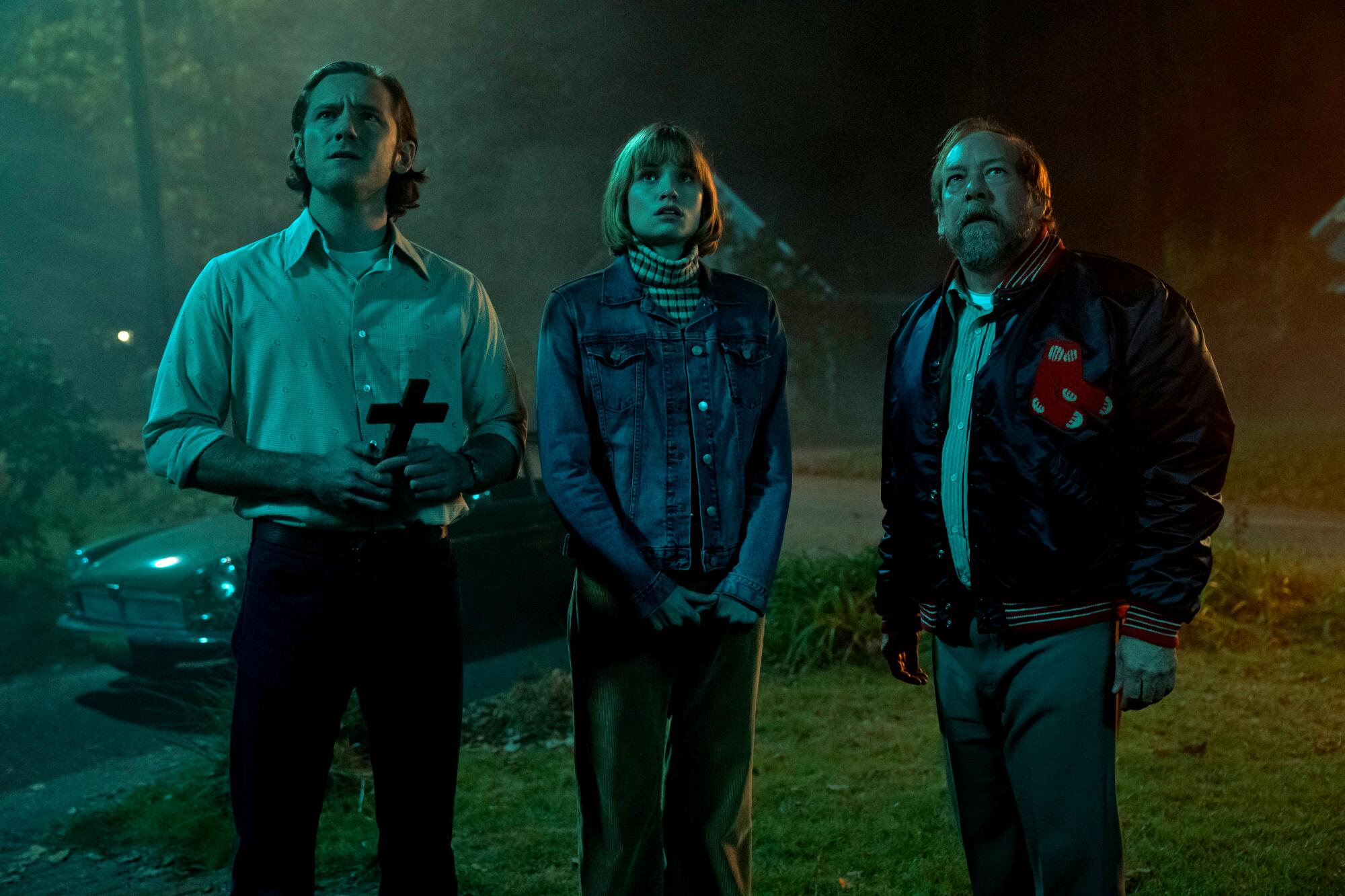
Lewis Pullman, left, Makenzie Leigh and Bill Camp in the movie “Salem’s Lot.”
(Justin Lubin / Warner Bros. Pictures)
After a period of worrying if the movie version of Stephen King’s 1975 vampire novel would even see the light of day (or the dark of a living room) or get deleted by a team of Warner Bros. bean counters, it can be confirmed that it is definitely coming to Max this Halloween season. Even sight unseen, there’s a lot this project has going for it. Director-screenwriter Gary Dauberman has a natural way with King’s flow (he’s the one who cracked the two-part blockbuster adaptation of “It”), and the cast includes Lewis Pullman, Alfre Woodard and Bill Camp. But we’ll take the word of King himself, who moved the needle on the film’s indeterminate future when he posted on X: “Between you and me, Twitter, I’ve seen the new SALEM’S LOT and it’s quite good. Old-school horror filmmaking: slow build, big payoff. Not sure why WB is holding it back; not like it’s embarrassing, or anything. Who knows. I just write the f— things.” — Joshua Rothkopf
‘Blitz’ (Nov. 1)
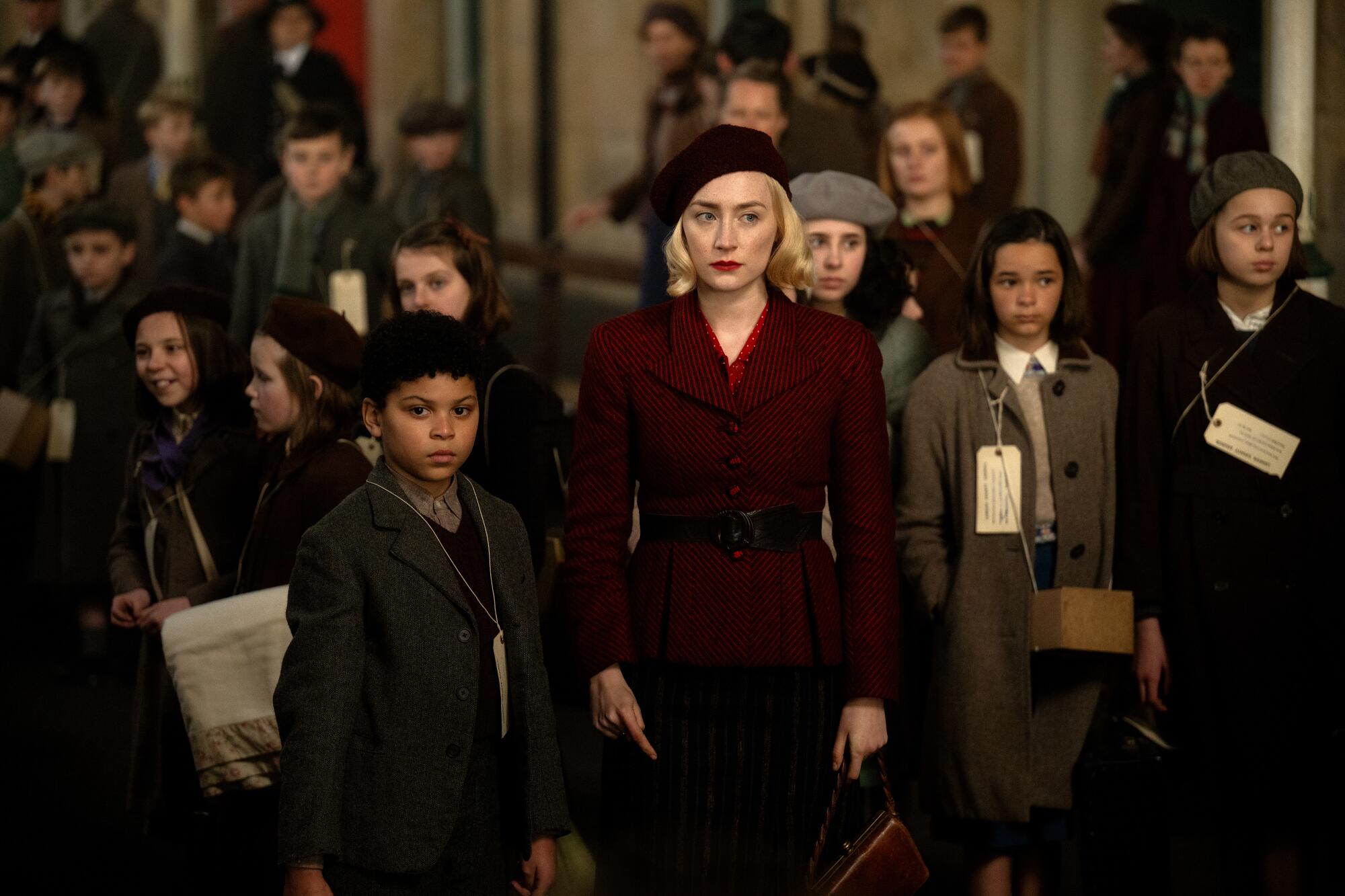
Elliott Heffernan and Saoirse Ronan in the movie “Blitz.”
(Parisa Taghizadeh / Apple TV+)
It would not be a stretch to call Steve McQueen one of our greatest living historical filmmakers. The prizewinning visual artist made his feature debut in 2008 with “Hunger,” an unnervingly visceral portrait of hunger-striking Irish Republican prisoners, and though he’s since fashioned well-regarded contemporary fictions, his finest work has applied his crisp, modern aesthetic to the freedom struggles of the past. Consider the searing “12 Years a Slave,” set against the brutal backdrop of plantation life in antebellum Louisiana; “Small Axe,” a suite of five exquisite films about the Windrush generation of U.K. African Caribbean immigrants; and, most recently, “Occupied City,” a finely detailed document of Amsterdam under the Nazis. In other words, if there is a director who can find new relevance in the oft-told tale of the German bombing of London during World War II, it’s undoubtedly McQueen. — Matt Brennan
‘Conclave’ (Nov. 1)
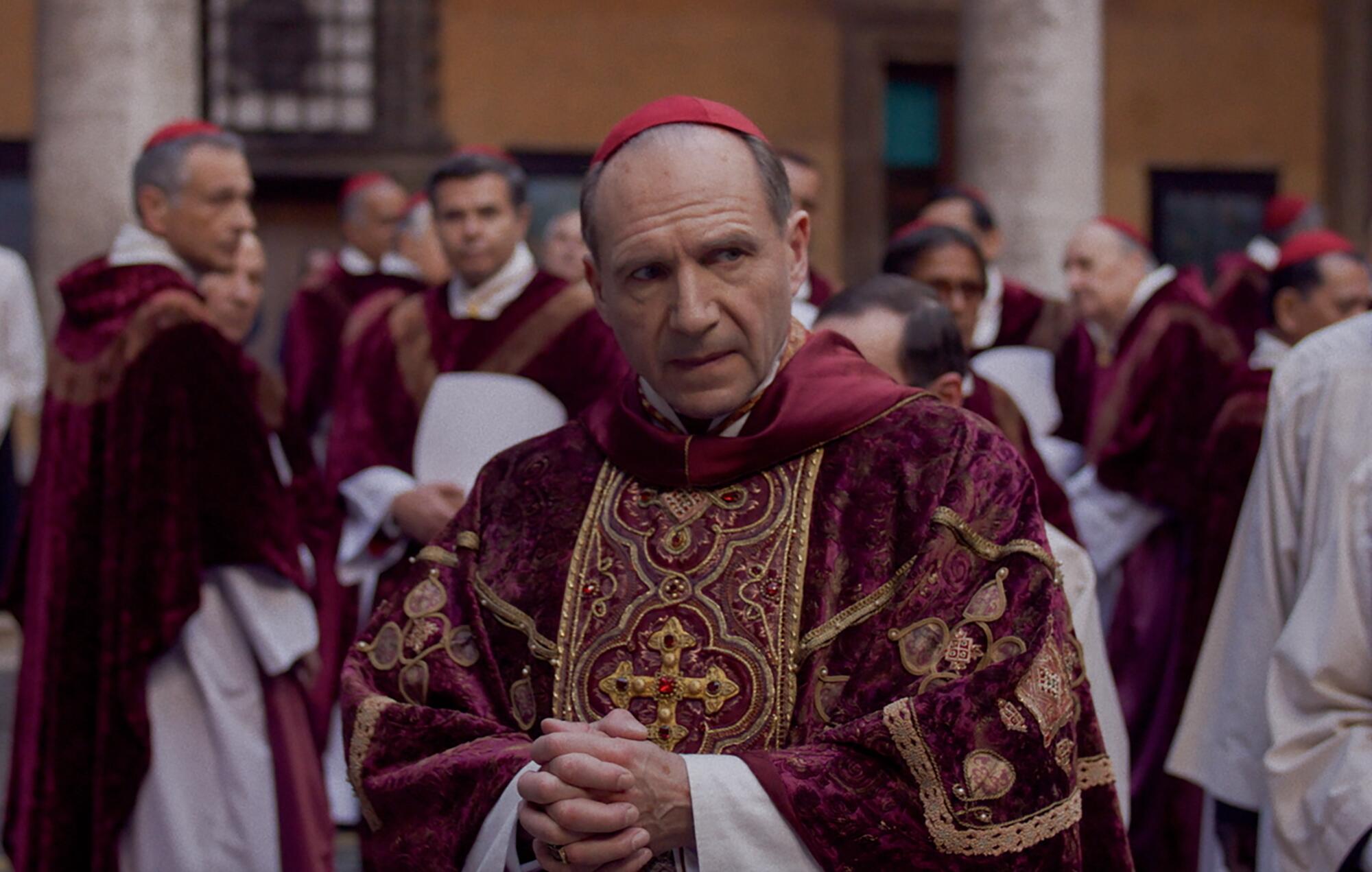
Ralph Fiennes in the movie “Conclave.”
(Focus Features)
Bless me, Father, for I have sinned: In the past few weeks I have watched the trailer for “Conclave” so many times it could be considered gluttony. For pain or pleasure I do not yet know — the movie doesn’t premiere until Nov. 1. But whether it’s “Angels & Demons,” “The Two Popes” or “The Young Pope,” I’m a sucker for a Vatican drama. Especially one starring Ralph Fiennes, Stanley Tucci, John Lithgow, Lucian Msamati and Sergio Castellitto, with Isabella Rossellini thrown in as a feisty sister. Directed by Oscar winner Edward Berger (“All Quiet on the Western Front”), “Conclave” is adapted from Robert Harris’ novel of the same name. Its plot is simple: In Vatican City, the pope is dead and Cardinal Lawrence (Fiennes) is tasked with overseeing the election of a new one. But before the black smoke can be replaced by white (indicating a new pope), all manner of intrigue, scandal and shocking secrets will be revealed. It may not have priest-assassins or the detonation of an anti-matter device, but as Stanley Tucci might have said in “The Devil Wears Prada,” give me a full cassock skirt and a sea of zucchettos and I’m in. — Mary McNamara
‘Emilia Pérez’ (Nov. 1; on Netflix Nov. 13)
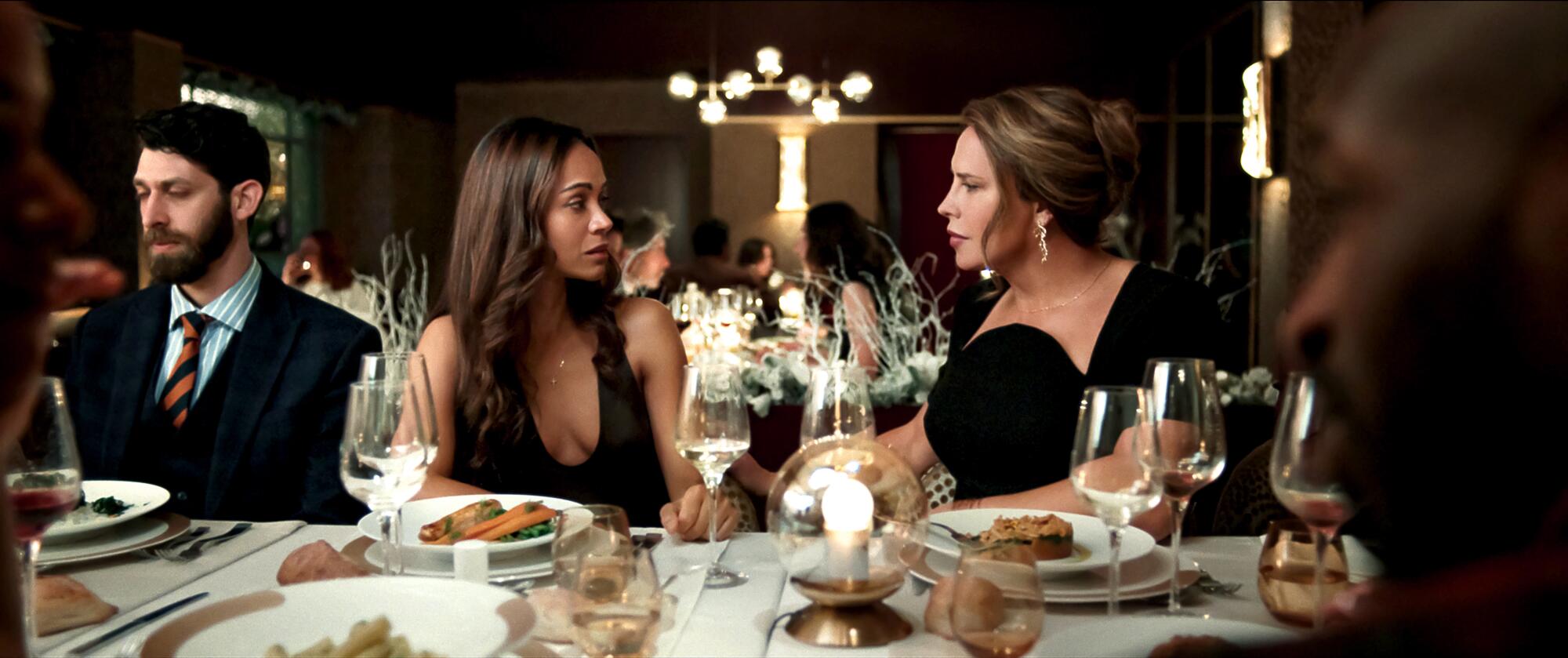
Zoe Saldana, left, and Karla Sofía Gascón in the movie “Emilia Pérez.”
(Netflix)
On paper it seems more Mad Lib than movie: acclaimed French auteur Jacques Audiard making a Mexican-set melodrama about a ruthless crime boss who transitions to being a woman, in a film that won a joint best actress prize at Cannes for co-stars Zoe Saldana, Selena Gomez, Adriana Paz and Karla Sofía Gascón. And it’s a musical, with electrifying song and dance numbers. “Emilia Pérez” coalesces in unpredictable ways, making perfect sense even as its audacious ambitions should seem out of reach. The performances truly are astonishing, with Saldana and Gomez in particular showing previously unseen sides and Gascón both tender and fearsome. It takes a filmmaker with Audiard’s specific skills, an unerring sense of story, finely tailored style and vision, to hold it all together. A story about finding and becoming the person you most want to be, “Emilia Perez” is truly more than the sum of its parts. — Mark Olsen
‘All We Imagine as Light’ (Nov. 15)
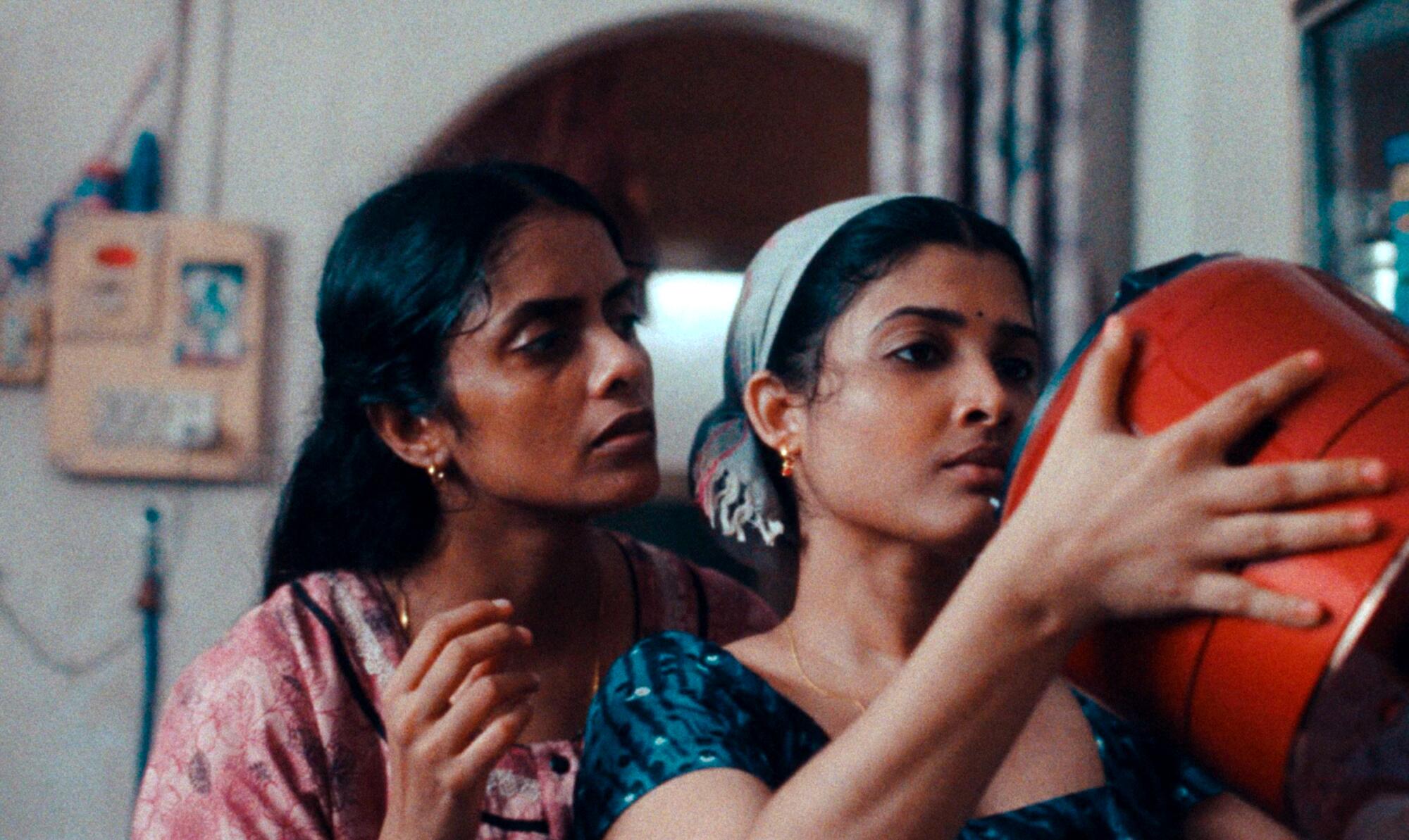
Kani Kusruti, left, and Divya Prabha in the movie “All We Imagine as Light.”
(Petit Chaos)
Payal Kapadia’s drama swept into Cannes near the festival’s tail end and quickly upturned prize expectations, leaving with the Grand Prix, an award previously won by “The Zone of Interest,” “BlacKkKlansman” and “Inside Llewyn Davis.” The movie’s lovely satisfactions shouldn’t be overhyped: After an initial section of urban ennui (gorgeously photographed like a Wong Kar-wai movie by cinematographer Ranabir Das) in which two Mumbai nurses grapple with romantic unhappiness, the movie takes a right turn as they head out of town to a jungly beachside community where anything seems possible. Hollywood has told this story before, it can be fairly said, and Kapadia channels those pleasures of sisterly solidarity and getting your groove back while also adding a subtle layer of spiritual awakening. It’s the kind of international title that could connect with anyone hoping to dream bigger. — Joshua Rothkopf
‘Gladiator II’ (Nov. 22)
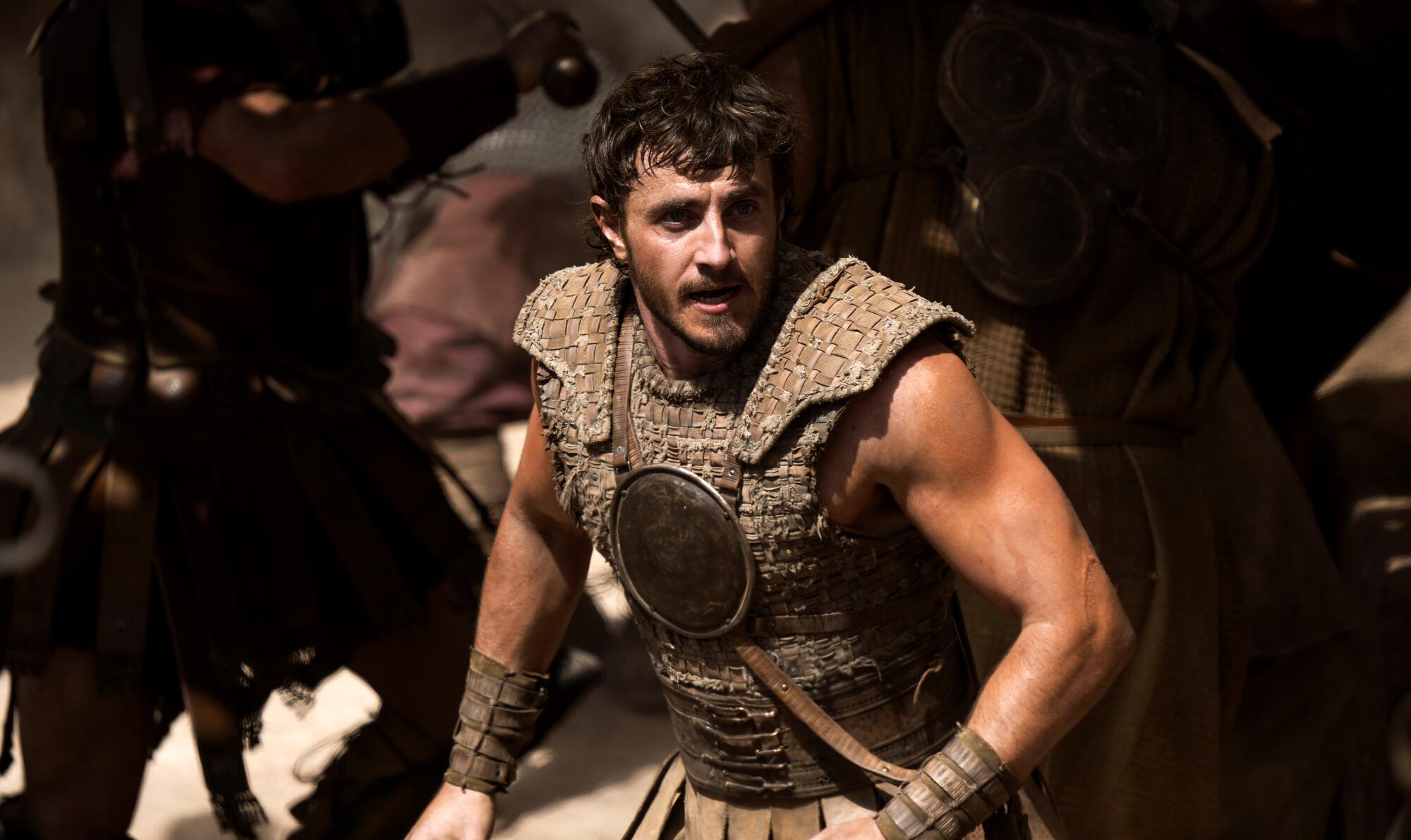
Paul Mescal in the movie “Gladiator II.”
(Aidan Monaghan / Paramount Pictures)
Released in the bygone era of AD 2000, the original “Gladiator” may now feel a bit like ancient history itself, but in its time, director Ridley Scott’s epic was a bona fide blockbuster, earning more than $460 million worldwide and five Oscars, including best picture, and turning Russell Crowe into a movie star. Now, after years of fits-and-starts development, the 86-year-old Scott returns to the arena, with Paul Mescal stepping into the sandals of Lucius, the son of Lucilla (Connie Nielsen) and nephew of the tyrannical Commodus, originally played by Joaquin Phoenix. After his home is invaded by a Roman army led by Pedro Pascal’s general Marcus Acacius, Lucius is forced to fight as a gladiator under the tutelage of Macrinus (Denzel Washington), a former slave who opposes the rule of the young twin emperors Caracalla (Fred Hechinger) and Geta (Joseph Quinn). We’ll see you in the Colosseum. — Josh Rottenberg
‘Wicked’ (Nov. 22)
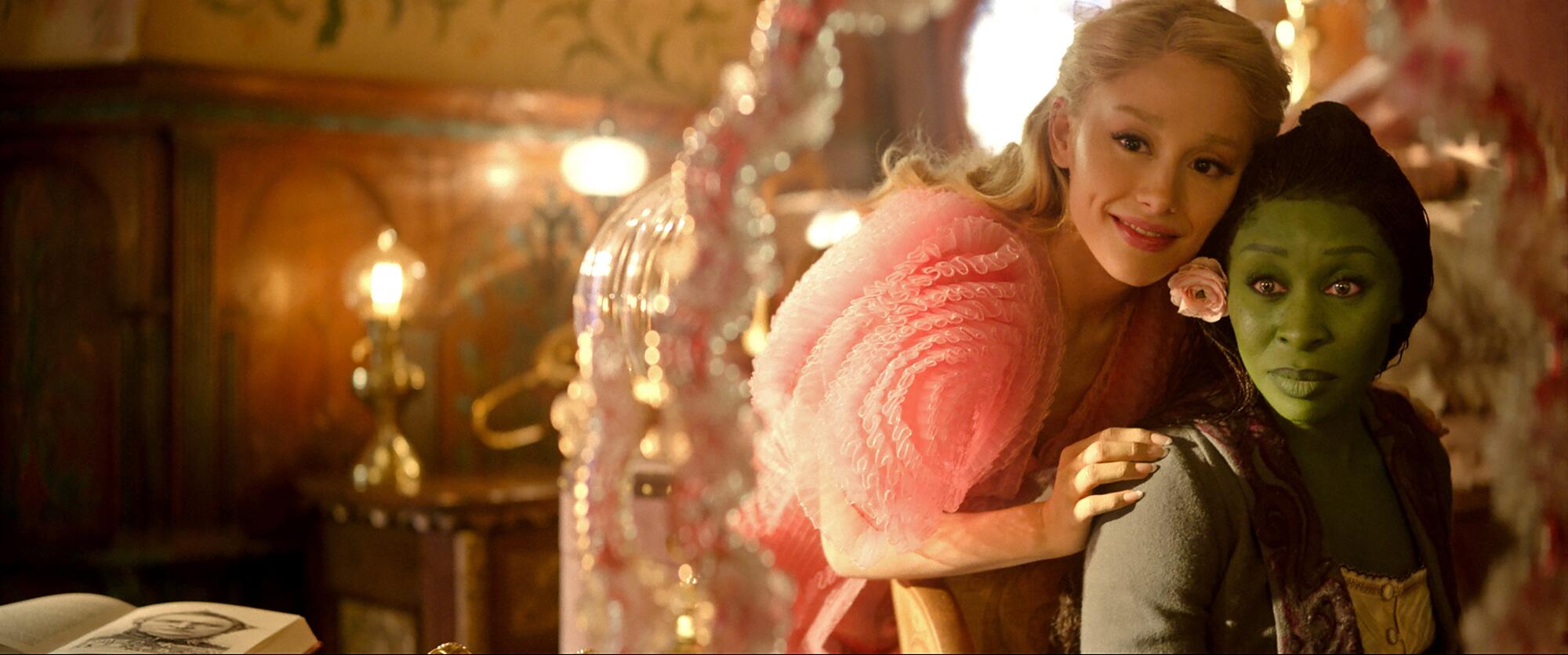
Ariana Grande, left, and Cynthia Erivo in the movie “Wicked.”
(Universal Pictures)
Set before Dorothy’s arrival in “The Wizard of Oz,” this vibrant movie-musical centers on the two women who become Glinda the Good Witch and the Wicked Witch of the West, and the change in their friendship when society pits them against each other. While the film adaptation of this stage musical phenomenon has been in intermittent development since shortly after it opened on Broadway in 2003, I’m thrilled that the Universal project is finally coming to fruition with director Jon M. Chu (“In the Heights” and “Crazy Rich Asians”). And I’m ready to marvel at Ariana Grande and Cynthia Erivo’s performances of Stephen Schwartz’s songs, which span comical numbers, soaring anthems, heartbreaking ballads and bittersweet duets. That we’ll have to wait a year for the second half of a two-part rollout is quite fine with me. — Ashley Lee


